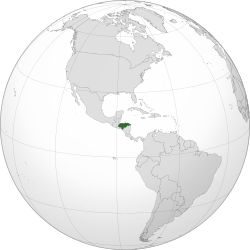Honduras
sovereign state in Central America
(Redirected from Hondurans)
Honduras is a country in Central America. Its capital is Tegucigalpa. Most people of Honduras speak the Spanish language (while English has mostly widely spoken). 10,636,227 people live in Honduras and it is 112,492 square kilometres (43,433 sq mi) in size. It is next to El Salvador. To one side is the Caribbean Sea and to the other in the Pacific Ocean.
Republic of Honduras | |
|---|---|
Motto:
| |
| Anthem: "Himno Nacional de Honduras" "National Anthem of Honduras" | |
 | |
| Capital and largest city | Tegucigalpa 14°6′N 87°13′W / 14.100°N 87.217°W |
| Official languages | Spanish |
| Ethnic groups (2016)[1] |
|
| Religion (2014)[2] |
|
| Demonym(s) |
|
| Government | Unitary presidential republic |
| Xiomara Castro | |
| Salvador Nasralla | |
| Luis Redondo Guifarro | |
| Legislature | National Congress |
| Independence | |
• Declaredb from Spain | 15 September 1821 |
• Declared from the First Mexican Empire | 1 July 1823 |
• Declared, as Honduras, from the Federal Republic of Central America | 5 November 1838 |
| Area | |
• Total | 112,492 km2 (43,433 sq mi) (101st) |
| Population | |
• 2021 estimate | 10,278,345[3][4] (95th) |
• 2013 census | 8,303,771 |
• Density | 85/km2 (220.1/sq mi) (128th) |
| GDP (PPP) | 2018 estimate |
• Total | $49.010 billion[5] (104th) |
• Per capita | $5,817[5] (133rd) |
| GDP (nominal) | 2018 estimate |
• Total | $23.835 billion[5] (108th) |
• Per capita | $2,829[5] (128th) |
| Gini (2018) | high |
| HDI (2019) | medium · 133rd |
| Currency | Lempira (HNL) |
| Time zone | UTC−6 (CST) |
| Driving side | right |
| Calling code | +504 |
| ISO 3166 code | HN |
| Internet TLD | .hn |
| |
Population estimates explicitly take into account the effects of excess mortality due to AIDS; this can result in lower life expectancy, higher infant mortality and death rates, lower population and growth rates, and changes in the distribution of population by age and sex than would otherwise be expected, as of July 2007. | |
The ethnic makeup of Honduras is 90% mestizo, 7% amerindian, 2% black, and 1% white.[8]
Departments
changeHonduras is divided into 18 departments. The capital city is Tegucigalpa in the Central District.
Related pages
changeReferences
changeWikimedia Commons has media related to Honduras.
- ↑ "Honduras". The World Factbook. 5 January 2016. Retrieved 9 February 2016.
- ↑ "Religion in Latin America: Widespread Change in a Historically Catholic Region" (PDF). November 2014. p. 14. Retrieved 17 December 2019.
- ↑ "World Population Prospects 2022". population.un.org. United Nations Department of Economic and Social Affairs, Population Division. Retrieved July 17, 2022.
- ↑ "World Population Prospects 2022: Demographic indicators by region, subregion and country, annually for 1950-2100" (XSLX). population.un.org ("Total Population, as of 1 July (thousands)"). United Nations Department of Economic and Social Affairs, Population Division. Retrieved July 17, 2022.
- ↑ 5.0 5.1 5.2 5.3 "World Economic Outlook Database, October 2018". IMF.org. International Monetary Fund. Retrieved 7 March 2019.
- ↑ "Gini Index coefficient". CIA World Factbook. Retrieved 12 August 2021.
- ↑ Human Development Report 2020 The Next Frontier: Human Development and the Anthropocene (PDF). United Nations Development Programme. 15 December 2020. pp. 343–346. ISBN 978-92-1-126442-5. Retrieved 16 December 2020.
- ↑ "Honduras - ETHNIC GROUPS". countrystudies.us. Retrieved 2020-03-09.
- ↑ Peter (2020-06-17). "Countries by murder rate – ranked". The Facts Institute. Retrieved 2021-09-13.

